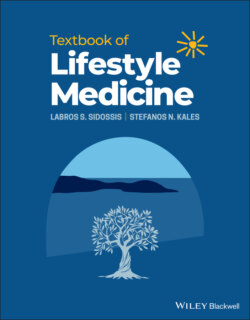Читать книгу Textbook of Lifestyle Medicine - Labros S. Sidossis - Страница 105
Key Point
ОглавлениеVegetarian diets have a lower carbon footprint.
Several national organizations and governments have published food guidelines for vegetarians. In 2013, a dietary pyramid illustrating the principles of the vegetarian diet was created by the Oldways Preservation Trust, which was a collaboration with scientists from several universities, including Harvard and Loma Linda University. In 2018, the VegPlate, a new Mediterranean diet‐based vegetarian food guide, was developed, based on the Italian Dietary Reference Intakes. The VegPlate contains six major food groups: grains, protein‐rich foods, vegetables, fruits, nuts and seeds, and fats (Figure 6.1). Recommendations for specific populations, such as women in pregnancy or lactation, are also included in the VegPlate.
FIGURE 6.1 (a) Basic structure of the VegPlate, which is the same for adults and for pregnancy and lactation. (b) Small plates are added to the main VegPlate for pregnancy and lactation during the second (P2) and third (P3) trimesters of pregnancy and lactation (L).
Source: Reprinted from Baroni et al. (2018).
A well‐planned vegetarian diet, containing a variety of foods and food groups such as vegetables, fruits, whole grains, legumes, nuts, and seeds, can provide adequate nutrition. In 2009, the American Dietetic Association (ADA) published a position statement regarding the nutrient adequacy and safety of a vegetarian diet:
It is the position of the American Dietetic Association that appropriately planned vegetarian diets, including total vegetarian or vegan diets, are healthful, nutritionally adequate, and may provide health benefits in the prevention and treatment of certain diseases. Well‐planned vegetarian diets are appropriate for individuals during all stages of the lifecycle, including pregnancy, lactation, infancy, childhood, and adolescence, and for athletes.
However, more recent data support the notion that the risk of specific nutrient deficiencies is real, especially in those following a vegan diet. Therefore, vegans must regularly consume sources of vitamin B12 and D, omega‐3 fatty acids, Ca, iodine, iron, and zinc, such as fortified foods or supplements – otherwise they may become deficient in these nutrients. Recent data support that not only vegans but also lacto‐ovo‐vegetarians are at risk of developing B12 deficiency, and thus all vegetarians could benefit from B12 supplementation.
